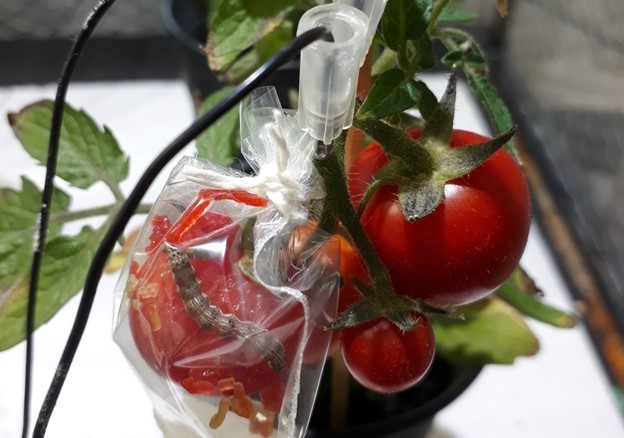Because fruits just dangle from the main plant before ultimately falling off, one might think that they are unable to communicate with that plant. According to new research, however, tomato fruits are able to transmit alerts to their mother plant when attacked by caterpillars.
Given the fact that sap typically only runs from the plant to the fruit – not back and forth between the two – it has long been unclear whether or not fruits can transmit information to the plant.
For the new study, which set out to address that question, scientists at Brazil’s Federal University of Pelotas started by placing tomato plants in a Faraday cage. Doing so blocked any external electromagnetic fields. Electrodes were attached to the ends of the plants’ branches, at the points where they connected to the fruits.
Utilizing those electrodes, the researchers measured electrical responses within the branches before, during and after a 24-hour period in which the fruits were attacked by Helicoverpa armigera caterpillars. Machine-learning-based algorithms were used to detect patterns within the recoded signals.

Gabriela Niemeyer Reissig
It was found that there was a “clear difference” in the patterns which were detected before and after the caterpillar attacks. Additionally, defensive biochemical responses were observed throughout the plants’ bodies, suggesting that they had been triggered by signals sent by the fruits.
“Since fruits are part of the plant, made of the same tissues of the leaves and stems, why couldn’t they communicate with the plant, informing it about what they are experiencing, just like regular leaves do?” says Dr. Gabriela Niemeyer Reissig, first author of a paper on the study. “What we found is that fruits can share important information such as caterpillar attacks – which is a serious issue for a plant – with the rest of the plant, and that can probably prepare other parts of the plant for the same attack.”
The scientists now plan on investigating whether other fruiting plants behave in the same manner as tomatoes, and whether their fruits respond to threats other than insects. It is hoped that the team’s findings could ultimately lead to earlier detection of pest infestations in crops, along with improvements in fruit quality, shelf life and pest resistance.
The paper was recently published in the journal Frontiers in Sustainable Food Systems.
Source: Frontiers
Source of Article